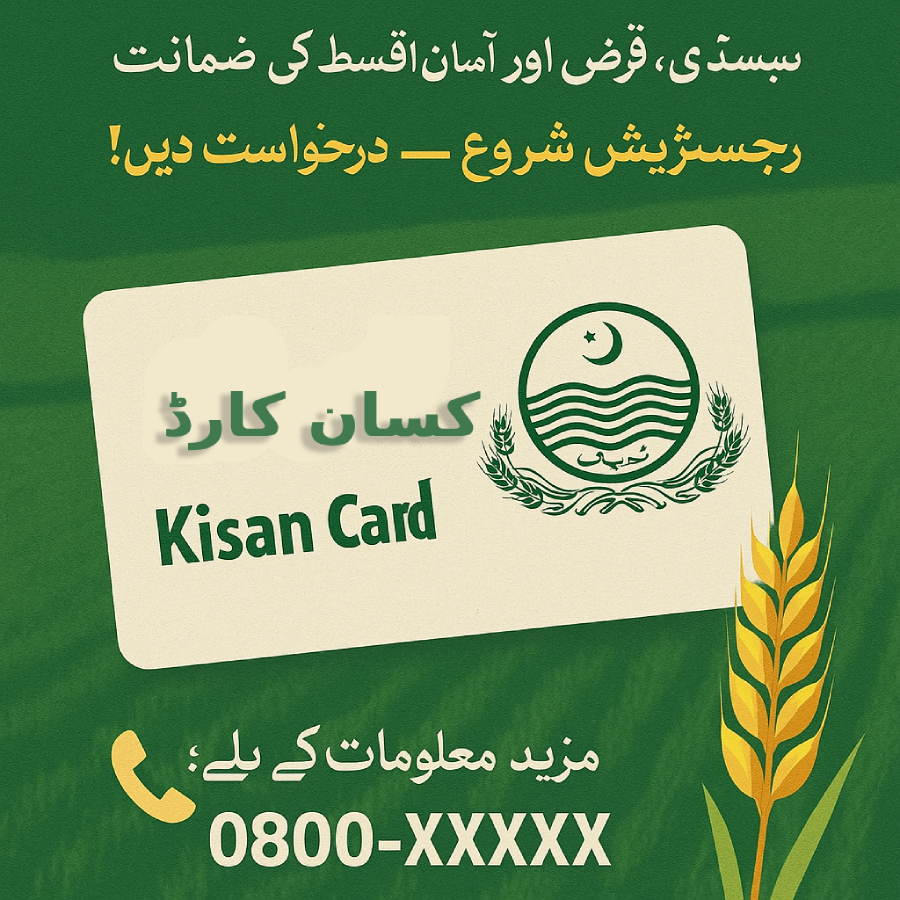Discover how the Punjab Government’s Kisan Card empowers farmers with subsidies, interest-free loans, crop insurance, and digital support. Apply now for agricultural relief and prosperity. Agriculture is the backbone of Pakistan’s economy, with nearly 60% of the population directly or indirectly dependent on it. Recognizing the importance of empowering farmers and modernizing the agricultural landscape, the Punjab Government has introduced a transformative initiative known as the Kisan Card. This card serves as a bridge between government resources and hardworking farmers, offering financial aid, subsidies, and technical support in a transparent and digitized manner.
What is the Kisan Card?
The Kisan Card is a government-issued smart card initiated by the Punjab Government of Pakistan to facilitate small and medium-scale farmers. This card provides a unified platform for farmers to access government-provided subsidies on fertilizers, seeds, pesticides, interest-free loans, crop insurance, and other agricultural inputs.
Managed by the Punjab Agriculture Department in collaboration with the Bank of Punjab (BOP), the card is designed to ensure direct benefit transfer (DBT), eliminating middlemen and reducing corruption.

Objectives of the Kisan Card Scheme
The Kisan Card program is driven by the following key objectives:
- Empowering Farmers – To financially empower small-scale farmers and ensure access to quality agricultural inputs.
- Promoting Transparency – To eliminate discrepancies in subsidy disbursement by using a digitized, card-based mechanism.
- Boosting Crop Yield – To increase agricultural productivity by enabling timely access to seeds, fertilizers, and other essentials.
- Providing Financial Support – To offer interest-free loans and crop insurance to protect farmers from market shocks and natural calamities.
- Digitizing Agriculture – To streamline the registration and tracking of subsidies and aid using digital tools.
Key Features of the Punjab Kisan Card
Here are some standout features of the Kisan Card Punjab:
- Subsidized Inputs – Receive government subsidies on certified seeds, fertilizers, and pesticides.
- Interest-Free Loans – Access up to Rs. 150,000 per crop cycle in zero-interest loans.
- Bank of Punjab Integration – Easy card issuance, withdrawal, and transaction facilities through BOP.
- Digital Verification – Farmers can verify eligibility and transactions via mobile.
- Crop Insurance – Financial coverage in case of crop failure due to disasters.
- Farmer Database – Maintains a digital record of all registered farmers and disbursements.
Benefits of the Kisan Card Program
The benefits of the Kisan Card initiative go beyond just financial aid. Here are some of the core advantages:
1. Financial Relief
Many farmers struggle with fluctuating input costs. The Kisan Card provides financial stability by offering:
- Direct subsidies
- Access to low or zero-interest loans
- Repayment flexibility
2. Transparency and Accountability
Government assistance now goes directly into the hands of registered farmers, minimizing chances of corruption or leakage.
3. Streamlined Access to Inputs
Farmers can buy agricultural inputs from registered vendors using their cards, which helps ensure quality and timely access.
4. Resilience in Farming
Crop insurance and government-backed financial support prepare farmers to face market risks, climate change, and other uncertainties more confidently.
5. Digital Inclusion
Farmers are encouraged to adopt digital banking and mobile usage, helping them become part of the financial mainstream.
Eligibility Criteria for Kisan Card
To apply for the Kisan Card in Punjab, farmers must meet the following conditions:
- Must be a resident of Punjab, Pakistan
- Should possess a valid CNIC (Computerized National Identity Card)
- Must own agricultural land or have a documented lease agreement
- Must be registered with the Punjab Land Record Authority (PLRA)
- Should not be a defaulter of any financial institution
- Must possess a valid mobile number registered in their name
How to Apply for Kisan Card?
Here’s a step-by-step guide to applying for the Kisan Card:
Step 1: Visit the Agriculture Office
Farmers should visit their nearest Tehsil Agriculture Office with:
- CNIC
- Mobile phone (SIM registered in their name)
- Land documents (ownership or lease)
Step 2: Biometric Verification
The Agriculture Officer will conduct biometric verification using the NADRA system to ensure authenticity.
Step 3: Land Verification
The applicant’s landholding is verified through the Punjab Land Record Authority (PLRA) online database.
Step 4: Bank of Punjab Account
Once verified, a Bank of Punjab account is created, and the Kisan Card is issued to the farmer.
Step 5: SMS Confirmation
Applicants receive an SMS notification once the card is ready. They can collect the card from designated BOP branches.
How to Use the Kisan Card
Once issued, farmers can use their Kisan Card for the following purposes:
- Purchasing agricultural inputs from registered dealers
- Receiving government subsidies directly
- Withdrawing funds from ATMs
- Applying for loans through the BOP network
- Availing crop insurance benefits
- Tracking transactions via SMS or mobile apps
Loan Facilities under Kisan Card
The Kisan Card enables farmers to apply for short-term agricultural loans with the following features:
- Maximum limit: Rs. 150,000 per crop cycle
- Interest: 0% (interest-free under government subsidy)
- Repayment period: Flexible, usually aligned with the crop cycle
- Disbursement through Bank of Punjab directly to the card
This loan can be used for:
- Purchasing seeds, fertilizer, and pesticides
- Hiring labor or machinery
- Managing irrigation or transport costs
Subsidies and Crop Support
The Punjab Government frequently announces special subsidy programs under the Kisan Card, including:
- Fertilizer Subsidy – Fixed amount per bag on urea and DAP fertilizers
- Seed Subsidy – Certified seed packages at subsidized rates
- Solar Pump Subsidy – Partial funding for solar-powered tube wells
- Wheat and Rice Campaigns – Seasonal crop support with exclusive packages
Crop Insurance and Risk Management
One of the strongest features of the Kisan Card is crop insurance. It protects farmers from unexpected losses due to:
- Floods
- Drought
- Hailstorms
- Pest attacks
The government covers a significant portion of the insurance premium, ensuring farmers don’t bear the burden alone.
Kisan Card Mobile App and Helpline
The Punjab Agriculture Department is also working on launching a mobile app where farmers can:
- Check subsidy balances
- Track transactions
- Apply for new programs
- Receive alerts on weather and crop advisory
A dedicated helpline (e.g., 0800-XXXXXX) is also available for queries and assistance.
Challenges and Future Prospects
While the Kisan Card is a revolutionary step, a few challenges remain:
Challenges
- Lack of awareness among illiterate farmers
- Network issues in rural areas affecting registration
- Delays in verification or card issuance
- Limited access to internet or smartphones
Future Prospects
To overcome these, the Punjab Government is planning:
- Village-level awareness campaigns
- Mobile teams for on-spot registration
- Integration with agri-tech platforms
- More private dealers for wider access to subsidized products
Kisan Card Success Stories
Several farmers across Punjab have already shared their positive experiences with the Kisan Card. For example:
Muhammad Riaz from Khanewal used his Kisan Card to access timely fertilizer subsidy and avoid crop failure. He says, “پہلے میں ادھار لیتا تھا، اب سبسڈی اور قرض کارڈ سے آسانی ہو گئی ہے۔”
Conclusion
The Kisan Card program by the Punjab Government is more than just a welfare scheme—it’s a vision for a modern, empowered, and sustainable agricultural sector. By providing direct subsidies, interest-free loans, and crop insurance, the government is fostering financial inclusion and enhancing food security.
With digital tools, improved access to resources, and ongoing support from the Punjab Agriculture Department, the Kisan Card stands as a beacon of hope for millions of farmers.
For updates, registrations, and inquiries, visit the official Punjab Agriculture Portal or contact your nearest agriculture office.

